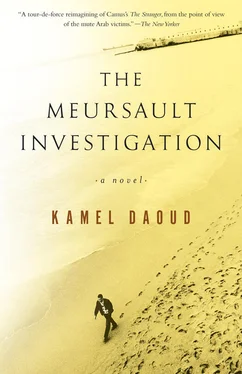What can I tell you, Mr. Investigator, about a crime committed in a book? I don’t know what happened on that particular day, in that gruesome summer, between six o’clock in the morning and two in the afternoon, the hour of Musa’s death. There we are! Besides, after Musa was killed, nobody came around to question us. There was no serious investigation. I have a hard time remembering what I myself did that day. In the morning, the same neighborhood characters were awake and on the street. Down at one end, we had Tawi and his sons. Tawi was a heavyset fellow. Dragged his bad left leg, had a nagging cough, smoked a lot. And early each morning, it was his habit to step outside and pee on a wall, as blithely as you please. Everybody knew him, because his ritual was so unvarying that he served as a clock; the broken cadence of his footsteps and his cough were the first signs that the new day had arrived in our street. Farther up on the right, there was El-Hajj, alias the pilgrim — which he was by genealogy, not because he’d made the trip to Mecca; El-Hajj was just his real given name. He too was the silent type. His main occupations seemed to be striking his mother and eyeing his neighbors with a permanent air of defiance. On the near corner of the adjacent alley, the Moroccan had a café called El-Blidi. His sons were liars and petty thieves, capable of stealing all the fruit off every possible tree. They’d invented a game: They would throw matches into the sidewalk gutters where the wastewater ran and then follow the course of those matches. They never tired of doing that. I also remember an old woman, Taïbia, big, fat, childless, and very temperamental. Something unsettling and even a little voracious in the way she looked at us — us, other women’s offspring — made us giggle nervously. The city, with its thousand alleys, was like a huge geological animal, and we were a little collection of lice on its back.
So on that particular day, nothing unusual. Even Mama, who loved omens and was sensitive to spirits, failed to detect anything abnormal. A routine day, in short — women calling to one another, laundry hung out on the terraces, street vendors. No one could have heard a gunshot from so far away, a shot fired way downtown, on the beach. Not even at the devil’s hour, two o’clock on a summer afternoon — the siesta hour. So, Mr. Investigator, I repeat, nothing unusual. Later, of course, I thought about it, and little by little, I concluded that there must be — among the thousand versions Mama offered, among her memory fragments and her still-vivid intuitions — there must be one version truer than the others. In our house in those days, there was something I’m not sure about, something I might call the smell of female rivalry floating in the air, rivalry between Mama and another woman. I never saw her, but Musa carried a trace of her in his voice, in his eyes, and in the way he had of violently rejecting Mama’s insinuations. So there was this harem tension, if I can call it that. Like a mute struggle between an exotic perfume and an overly familiar kitchen smell. In our neighborhood, all the women were “sisters.” A code of respect prevented the more interesting sorts of romance and reduced the game of seduction to wedding parties or mere glances exchanged while the women hung out the wash on the terraces. For young men of Musa’s age, I imagine the neighborhood “sisters” offered the prospect of practically incestuous and not particularly passionate marriages. Now there were a few skirt-wearing, firm-breasted Algerian women who shuttled between our world and the world of the roumis , down in the French neighborhoods. We brats used to call them whores and stone them with our eyes. They were fascinating targets, because they could promise the pleasures of love without the inevitably of marriage. Those women often inspired violent passions and hateful rivalries, the sort of thing your writer alludes to a few times in his book. However, his version is unfair, because the unseen woman he mentions wasn’t Musa’s sister. One of his girlfriends, maybe. And there, I’ve always thought, is where the misunderstanding came from; what in fact was never anything other than a banal score-settling that got out of hand was elevated to a philosophical crime. Musa wanted to save the girl’s honor by teaching your hero a lesson, and he protected himself by shooting my brother down in cold blood on a beach. Men in the working-class neighborhoods of Algiers actually did have an exaggerated, grotesque sense of honor. Defend our women and their thighs! I tell myself that after losing their land, their wells, and their livestock, women were all our guys had left. This rather feudal explanation makes me smile too, but do me a favor and think about it. It’s not completely crazy. The story in that book of yours comes down to a sudden slipup caused by two great vices: women and laziness. So — and I really think this sometimes — there were indeed some traces of a woman, a scent of jealousy, in Musa’s last days. Mama never spoke about it, but in our neighborhood, after the crime, I was often greeted as the heir of some recovered honor, though I could never figure out the reasons why, child that I was. Nevertheless, I knew it! I could feel it. By telling me so many implausible tales and outright lies, Mama eventually aroused my suspicions and put my intuitions in order. I reconstructed the whole thing. Musa’s frequent binges in that last period, the scent floating in the air, his proud smile when he ran into his friends, their overly serious, almost comical confabs, the way my brother had of playing with his knife and showing me his tattoos. Echedda fi Allah , “God is my support.” “March or die” on his right shoulder. “Be quiet” on his left forearm, under a drawing of a broken heart. That was the only book Musa wrote. Shorter than a last sigh, consisting of three sentences on the oldest paper in the world, his own skin. I remember his tattoos the way other people remember their first picture book. Other details? Oh, I don’t know, his overalls, his espadrilles, his prophet’s beard, and his big hands, which tried to hold on to our father’s ghost, and his involvement with a nameless, honorless woman. I’m not sure, Mr. Student Detective.
Ah! The mystery woman! Provided that she existed at all. I know only her first name; at least, I presume it was hers. My brother had spoken it in his sleep that night, the night before his death. Zubida. A sign? Maybe. In any case, the day Mama and I left the neighborhood forever — Mama had decided to get away from Algiers and the sea — I’m sure I saw a woman staring at us. A very intense stare. She was wearing a short skirt and tacky stockings, and it seems to me she’d done her hair like the movie stars in those days: Although she was quite obviously a brunette, her hair was dyed blond. “Zubida forever,” ha, ha! Maybe my brother had those words tattooed somewhere on his body as well, I don’t know for sure. But I am sure it was her that day. It was early in the morning. We were setting out, Mama and I, leaving the house for good, and there she was, holding a little red purse, staring at us from some distance away. I can still see her lips and her huge eyes, which seemed to be asking us for something. I’m almost certain it was her. At the time, I wanted it to be her and I decided it was, because that enhanced my brother’s demise somehow. I needed Musa to have had an excuse and a reason. Without realizing it, and years before I learned to read, I rejected the absurdity of his death, and I needed a story to give him a shroud. Well, then. I pulled Mama by her haik, so she didn’t see her. But she must surely have sensed something, because she made a horrible face and spat out a prodigiously vulgar insult. I turned around, but the woman had disappeared. And then we left. I remember the road to Hadjout, lined with fields whose crops weren’t destined for us, and the naked sun, and the other travelers on the dusty bus. The oil fumes nauseated me, but I loved the virile, almost comforting roar of the engine, like a kind of father that was snatching us, my mother and me, out of an immense labyrinth made up of buildings, downtrodden people, shantytowns, dirty urchins, aggressive cops, and beaches fatal to Arabs. For the two of us, the city would always be the scene of the crime, or the place where something pure and ancient was lost. Yes, Algiers, in my memory, is a dirty, corrupt creature, a dark, treacherous man-stealer.
Читать дальше












